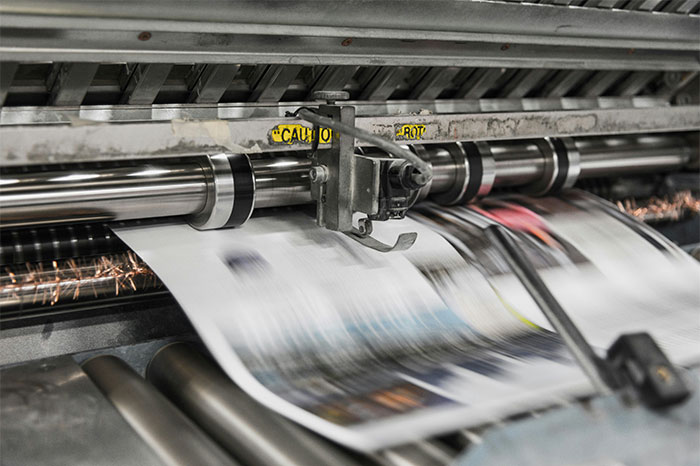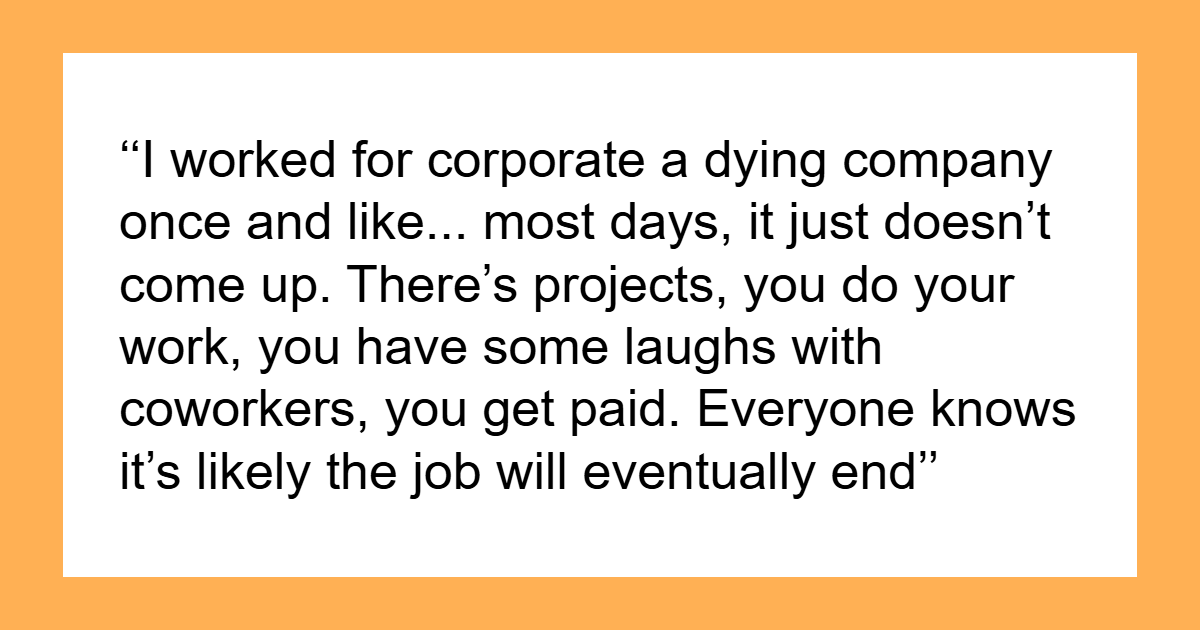“Overworked And Underpaid”: 55 People Share What It’s Like To Work At A ‘Dying’ Company
 Didn’t take the job but I interviewed for Claire’s a few months ago and the interviewer explicitly mentioned they’re really struggling and asked me my strategy to target customers from the demographics of competition stores. I’d never actually shopped at a Claire’s before but walked out of the interview thinking ‘oh they’re going under soon’..
Didn’t take the job but I interviewed for Claire’s a few months ago and the interviewer explicitly mentioned they’re really struggling and asked me my strategy to target customers from the demographics of competition stores. I’d never actually shopped at a Claire’s before but walked out of the interview thinking ‘oh they’re going under soon’..
if (!BoredPanda.Config.isTabletWidth) {
if (BoredPanda.Config.departments.includes(‘main-editorial’)) {
pdID = BoredPanda.Config.experimentVariation < 2 ? 118361 : 118363;
} else if (BoredPanda.Config.departments.includes('news')) {
pdID = BoredPanda.Config.experimentVariation < 2 ? 117965 : 117967;
} else {
pdID = BoredPanda.Config.experimentVariation < 2 ? 116845 : 120299;
}
} else if (BoredPanda.Config.isTabletWidth) {
if (BoredPanda.Config.departments.includes('main-editorial')) {
pdID = BoredPanda.Config.experimentVariation < 2 ? 118540 : 118541;
} else if (BoredPanda.Config.departments.includes('news')) {
pdID = BoredPanda.Config.experimentVariation < 2 ? 118537 : 118538;
} else {
pdID = BoredPanda.Config.experimentVariation < 2 ? 118535 : 120301;
}
}
if (BoredPanda.Config.bpVersion === 'news') {
pdID = 119689;
}
trfData = BoredPanda.TrafficSources.getData();
_subIdParts = [
BoredPanda.Config.postId,
BoredPanda.Config.pos.filter((t) => !t.includes('_')).join('_'),
trfData.source.replace(',', '').substr(0, 20),
trfData.medium.replace(',', '').substr(0, 20),
trfData.campaign.replace(',', '').substr(0, 20),
];
subId = _subIdParts.join(',');
if (!BoredPanda.Config.isMobileWidth) {
(function (d, s, b) {
var mElmt, primisElmt = d.createElement('script');
primisElmt.setAttribute('type', 'text/javascript');
primisElmt.setAttribute('async', 'async');
primisElmt.setAttribute('src', s);
var elmtInterval = setInterval(function () {
mElmt = d.getElementById(b);
if (mElmt) {
mElmt.parentNode.insertBefore(primisElmt, mElmt.nextSibling);
mElmt.parentNode.removeChild(mElmt);
return clearInterval(elmtInterval);
}
}, 20);
})(document, 'https://live.primis.tech/live/liveView.php?s=' + pdID + '&subId=' + subId + '&playerApiId=bpbase_desktop', 'desktop-widget-loaded');
}
American corporate bankruptcies soared to a 14-year high last year, with a total of 694 companies shutting shop by the end of 2024. This year isn’t going too well either. So far, more than 10 million workers have already been laid off or discharged.
One day everyone’s happy and productive. The next, it feels like a funeral. When a company heads to the graveyard, it can happen fast, or it can be a slow and painful death for everyone involved.
Hopefully, management will be transparent about what’s going on and what’s being done about it, but that’s not always the case. So how do you know your workplace is about to become the Titanic?
Keep scrolling to find out…
 I worked in newspapers, on the printing side. It was staffed entirely by older people who were basically unhirable trying to pad out their 401k before they hit 70 and younger uneducated people who are glad to be doing anything other than food service or retail.
I worked in newspapers, on the printing side. It was staffed entirely by older people who were basically unhirable trying to pad out their 401k before they hit 70 and younger uneducated people who are glad to be doing anything other than food service or retail.
Generally speaking, we were overworked and underpaid but for someone like me it was godsend opportunity. I went from washing dishes 7 days a week and barely making ends meet, to having weekends off and two weeks of paid vacation every year..
 A friend of mine retired from the local paper where he’d worked for 25 years. By the time he left, the paper’s staff consisted of:
A friend of mine retired from the local paper where he’d worked for 25 years. By the time he left, the paper’s staff consisted of:
– The editor/publisher/reporter
– The adman (himself) who doubled as photographer
– one constantly-turning-over-reporter position, which didn’t require a journalism degree
– one stringer photographer who also did some reporting
When he started in 1999 they had a staff of 20+, including a stable of reporters and dedicated photographers, and numerous ad-peeps.
He said he was glad he got into it when he did, but he effectively worked through the post-peak years of local journalism.
Experts say one of the first signs is when you start seeing the top employees jump ship. When the blue-eyed boys and girls suddenly start handing in their resignations, it’s often a cue that trouble is brewing.
Another red flag is when pay raises across the board grind to a screeching halt. According to Angie Segal from ActionCOACH, companies stop increasing salaries when they’re on life support and if it’s been more than a year since the last raises were given, best you get your funeral clothes out. Or find yourself another job asap.
 I worked for corporate a dying company once and like… most days, it just doesn’t come up. There’s projects, you do your work, you have some laughs with coworkers, you get paid.
I worked for corporate a dying company once and like… most days, it just doesn’t come up. There’s projects, you do your work, you have some laughs with coworkers, you get paid.
Everyone knows it’s likely the job will eventually end. There are people who are very, very paranoid about layoffs and will talk about them a lot. Those people are annoying, honestly, it’s not worth being paranoid all the time. Make a plan/decision about what you’ll do and do that thing. The decision could be finding another job and leaving soon, or waiting it out to see what happens.
 I worked at a telephony service out of university, they were selling VOIP technology to big customers like CISCO and Nortel. At one point they were massive, almost 500 people working at the main headquarters’ call centre. By the time I joined there were 10 of us, operating out of a tiny section of this once massive, mothballed office.
I worked at a telephony service out of university, they were selling VOIP technology to big customers like CISCO and Nortel. At one point they were massive, almost 500 people working at the main headquarters’ call centre. By the time I joined there were 10 of us, operating out of a tiny section of this once massive, mothballed office.
Our chief IT guy had an entire floor to himself and worked on the complete other side of the building… At night he would construct massive castles out of old desks and divider walls.
Working there was alright, mostly we were there to maintain support on the remaining existing contracts but it was pretty clear the company was just waiting to be put out of its misery by the new bigger companies in the market.
It was a kind of boring job and ultimately after being a mediocre employee for five years, I was fired for watching Invader Zim episodes I’d downloaded off Napster on the company computers.
 In our 100 year old company, they hired a CEO from outside the company. Previously, the CEO always came up through the ranks and was promoted into the position. The first thing the new CEO did was start cutting senior people because people were too “comfortable”. In a few months 900 people were “separated”. Morale tanked, productivity dropped, and a bunch of clients went to competitors. Those of us who were left started a low key “Say Hello” campaign. If anyone, especially a manager said, “Good Morning.” our reply would be , “Hello.” Someone eventually asked why, and got the explanation that there hasn’t been a good morning here since the new CEO took over.
In our 100 year old company, they hired a CEO from outside the company. Previously, the CEO always came up through the ranks and was promoted into the position. The first thing the new CEO did was start cutting senior people because people were too “comfortable”. In a few months 900 people were “separated”. Morale tanked, productivity dropped, and a bunch of clients went to competitors. Those of us who were left started a low key “Say Hello” campaign. If anyone, especially a manager said, “Good Morning.” our reply would be , “Hello.” Someone eventually asked why, and got the explanation that there hasn’t been a good morning here since the new CEO took over.
The company tried to show how wonderful and responsive it was by doing an “employee satisfaction survey”. The results were dismal. Rather than address the employees’ concerns, The CEO decided to solve the problem by not doing any more satisfaction surveys.
The CEO eventually “left the company to pursue other opportunities”, which was code for he was fired. The damage was already done. Fewer clients meant a declining workload, and I was eventually “separated”, but I was already mid-60’s and just took retirement.
The company still exists, but it is a mere shadow of its former status.
A similar sign is when the benefits dry up. If your benefits have suddenly been cut, for whatever reason the bosses claim, it could be time to seek other benefits – and a new job – elsewhere.
“Good companies use rich benefits to become an employer of choice (think Google or Facebook),” explains street.com. “Dying companies plain don’t care anymore about who punches in. Be especially wary of fancy mathematics designed to camouflage a benefits cut. If it quacks like a duck, you know what it is.”
 I’ve worked for some failing startups. Upper management is very stressed because they think they can possibly turn things around if we just… bagged another investor, sold a few more units, etc.
I’ve worked for some failing startups. Upper management is very stressed because they think they can possibly turn things around if we just… bagged another investor, sold a few more units, etc.
Rest of us know the end is near. Lunch talks are all about interviews and who’s hiring. We are happy when someone leaves.
I’m just collecting the paycheck and padding my 401k. The call from HR is coming before the end of the year. It’s inevitable. But I show up, do my job, document everything, and go home at 5pm. Every day.
 I don’t work at a dying company, but I have in the past. Think big tech company that almost went under.
I don’t work at a dying company, but I have in the past. Think big tech company that almost went under.
Honestly, it really sucked. From the time I started there just out of university to when I was finally let go 4 years later, the company lost 90% of its employees and was one quarter of bad news after another.
I was constantly having to weigh leaving vs. hoping for something good to turn things around. There was always some sort of hopeful news from the execs, some turn around just around the corner that never came.
The work dried up. Days took longer and longer to pass by. Pretending to work became more difficult. Watching whole teams get let go and lose their jobs was hard. Re-organized from team to team to team. New leaders who didn’t know what I did, or cared. The eventual realization that my peers at other companies were learning, progressing, getting promoted, get bonuses, etc. while I languished was devastating.
I finally told my boss I would take a package if another round of layoffs came and then it was just a matter of time.
Thank god I don’t work there anymore and have found myself in far better pastures.
Are you spotting management and/or colleagues heading into mysterious meetings behind closed doors? Do they emerge looking defeated? Are there whispers in the corridors? Don’t ignore this. You might be the next one called into an unexpected meeting that leaves you unemployed.
And on the subject of meetings, HR experts say another red flag is company mergers or acquisitions. Even if management claims there’ll be no impact on current jobs, you might want to prepare for the worst.
“No matter what the leadership says, when there is a merger or acquisition, there will be an elimination of redundant heads,” saysglobal career expert and author, Dana Manciagli. “It may not be immediate, but it’s coming.”
 I work at a super famous, 150 year old company that is dying the slowest of deaths (hint: they had their own tower in Chicago at one point). There’s some great people that have been there a long time. General mood is people are trying their best but turning things around and restoring the glory to this once great company is like pissing up a rope.
I work at a super famous, 150 year old company that is dying the slowest of deaths (hint: they had their own tower in Chicago at one point). There’s some great people that have been there a long time. General mood is people are trying their best but turning things around and restoring the glory to this once great company is like pissing up a rope.
Has the proverbial water stopped flowing? Does it suddenly feel muddy and stagnant? That’s also a sign, says CEO of HR consulting firm OperationsInc, David Lewis.
He warns that a company is probably in deep trouble when “your boss has been in that role for X number of years, as has their boss – and so on – and you do not see any place for them to move upward…meaning you are not going anywhere.”
According to Lewis, this shows long-term lack of growth and you should probably follow the signs to the nearest exit.
 Many years ago my brother Byron worked for an American oil company that was once a regional powerhouse and had a big skyscraper. They got bought by a European company who didn’t want to immediately fire all the Americans for PR reasons, but everyone there knew that their days were numbered. Morale was terrible. It seemed like each week about 1/2 of a floor would be fired. Byron was particularly worried since he worked in an area easy to outsource. So the day his boss came into his office Byron was sure he was going to be let go. Much to his surprise, his boss let him know that he was the one who had been fired and told Byron, that as far as he knew, Byron still had a job. So Byron kept coming to work but had no one to report to. His direct deposit kept coming thru every two weeks and he came into the office and worked on getting a new job. Finally one of the European managers who showed up periodically told him he might as well “work from home” and that he would call him if they needed him to come in.
Many years ago my brother Byron worked for an American oil company that was once a regional powerhouse and had a big skyscraper. They got bought by a European company who didn’t want to immediately fire all the Americans for PR reasons, but everyone there knew that their days were numbered. Morale was terrible. It seemed like each week about 1/2 of a floor would be fired. Byron was particularly worried since he worked in an area easy to outsource. So the day his boss came into his office Byron was sure he was going to be let go. Much to his surprise, his boss let him know that he was the one who had been fired and told Byron, that as far as he knew, Byron still had a job. So Byron kept coming to work but had no one to report to. His direct deposit kept coming thru every two weeks and he came into the office and worked on getting a new job. Finally one of the European managers who showed up periodically told him he might as well “work from home” and that he would call him if they needed him to come in.
Byron was pretty depressed since no one else was hiring. So he stopped looking for a job. He stayed home and started drywalling his unfinished basement. And the direct deposits kept coming. Months later, in-laws came to visit and they got on his nerves after a few days so he got dressed up and went into his office to get away from them. As it turns out, the European manager was in town also and came into his office and said “Byron – that’s an English name, right?” Byron agrees that it is, and the manager invited him to a meeting that afternoon. When he showed up, the manager greeted him by his name and told everyone “this is Byron and he is going to take notes.” So Byron takes notes, gets several assignments, and is back working full time. No one asks what he has been doing for six months. He figured that having a non-American sounding name was all it took.
 Like many of you, I got out of my chosen career radio, because of corporate America. When good/great ratings and decently paid announcers were looked at as solely a cost and no benefit, I bailed.
Like many of you, I got out of my chosen career radio, because of corporate America. When good/great ratings and decently paid announcers were looked at as solely a cost and no benefit, I bailed.
There is VERY little original content being produced in your local markets. One reason why they lean so heavily on sports. Other than that, a few major broadcast companies own most of the radio stations and they force announcers to record daily radio shows in markets that they have never even set foot into. Basically, “that was ____, here is _____.”
Local radio, with a few exceptions, is dead.
 Not necessarily a company, but I’ve worked on broadway shows that have closed and the morale can be pretty bad. Looking at grosses and being like we are gonna have a company meeting any week now, and not knowing if you were gonna close immediately or have a couple more weeks can be pretty stressful. It’s hard to predict what’s gonna be successful and there’s nothing worse than thinking you are on a sure fire hit and seeing the house is only at 60 percent capacity most days lol.
Not necessarily a company, but I’ve worked on broadway shows that have closed and the morale can be pretty bad. Looking at grosses and being like we are gonna have a company meeting any week now, and not knowing if you were gonna close immediately or have a couple more weeks can be pretty stressful. It’s hard to predict what’s gonna be successful and there’s nothing worse than thinking you are on a sure fire hit and seeing the house is only at 60 percent capacity most days lol.
When your family, friends and former neighbors start calling to ask if you still have a job, it’s probably not because the Virgin Mary came to them in a premonition.
“If your immediate family members are worried, chances are there’s a good reason why,” warns Vicky Oliver, author of “Bad Bosses, Crazy Coworkers & Other Office Idiots.”
The same applies to seeing negative media reports or tweets about your company. Bad news travels fast, says Oliver. And you should “Try to figure out how your skills will mesh better in a job that’s not a dead end.”
 I worked at a tiny failing airline once and tbh the morale was no worse than any other company I’ve worked at.
I worked at a tiny failing airline once and tbh the morale was no worse than any other company I’ve worked at.
Me and pretty much everyone I knew had no real vested interest in that company other than a paycheck, so none of us really GAF about the company at all.
It was annoying having to deal with vendors refusing service on occasion because the company wasn’t paying its bills and there were jokes with each other about hoping our paychecks didn’t bounce, but beyond that it was like any other job.
Somehow it managed to limp along for another 15 years or so after I left.
 I don’t work there but I did some consulting for JCPenny like 10 years ago. Flew out to Plano Texas from the Bay and I still think about what a weird trip that was. Plano was exactly as the name implies, plain, just gated housing communities and strip malls.
I don’t work there but I did some consulting for JCPenny like 10 years ago. Flew out to Plano Texas from the Bay and I still think about what a weird trip that was. Plano was exactly as the name implies, plain, just gated housing communities and strip malls.
I’ll put an emphasis on strip because when I tried to find somewhere to eat everywhere in the strip mall was either fast food or some knock off hooters. Like 4 different restaurants, that I later found out were called BREASTruants.
I went into JCP the next day and the campus is so f*****g funny. It’s themed like a mall, but like a mall from the 80s when it was built. All the stores were the entrances to the different departments cube farms. I met with the tech team and they were the biggest “I’ll just take a paycheck” folks I’ve ever worked with. At lunch they took me to bbq at a place called Bone Daddies, well, that was infact another breastraunt!
Had to do dinner with them and their manager and the manager spent the whole day telling me about how much California sucks and how much better texas was. Finally he told me that everyone in this restaurant think how great it would be if California had an earthquake and fell into the sea and he asked me what we think of Texas.
I had finally had enough and simply told that I guess we don’t spend as much time thinking of them as they do us. He shut up after that and didn’t stay for the drinks we were supposed to have after.
So JCP was uhhhh not great.
 I worked at a dying company. It was insane going into every single f*****g meeting thinking I was losing my job. Then, when it came to upper leadership, 50+ year olds would start crying (nothing bad about crying) because they don’t know how to build a resume, or network, or know what to do if they ended up getting fired.
I worked at a dying company. It was insane going into every single f*****g meeting thinking I was losing my job. Then, when it came to upper leadership, 50+ year olds would start crying (nothing bad about crying) because they don’t know how to build a resume, or network, or know what to do if they ended up getting fired.
HQ restructured the jobs and areas like… I feel like 5 times since I was there and left? Every few months you hear about them struggling to breathe.
According to data from demandsage.com, around 1.5 million people are laid off each month in the U.S. alone. That’s an estimated 18 million workers annually.
40% of Americans surveyed said that they’ve been laid off or terminated from their job at least once in their career, while close to half (48%) claimed to have layoff anxiety.
Most layoffs occur in startup companies, notes the site. “In the past years, not only were the employees laid off but the startup companies as a whole were reported to be laid off,” it adds.
 I didn’t work for a big dying company but I did work in mortgage during the 2007 mortgage crisis. I would go to work every day for months, worried and wondering is today the day I get laid off. All my work experience was in mortgage and knowing that if I lost my job I most likely would not find another one was stressful and terrifying. I did end up getting layed off and could not find work in my industry and once my unemployment was close to running out I had to pivot to a new sector (payroll) and start from scratch.
I didn’t work for a big dying company but I did work in mortgage during the 2007 mortgage crisis. I would go to work every day for months, worried and wondering is today the day I get laid off. All my work experience was in mortgage and knowing that if I lost my job I most likely would not find another one was stressful and terrifying. I did end up getting layed off and could not find work in my industry and once my unemployment was close to running out I had to pivot to a new sector (payroll) and start from scratch.
 I worked for a retail company and left about a year before they fully went under. Morale at my store was fine, largely because the head office tried really hard to hide their struggles. We knew the writing was on the wall eventually because the products the stores sold were becoming obsolete, but we didn’t think it would happen so fast.
I worked for a retail company and left about a year before they fully went under. Morale at my store was fine, largely because the head office tried really hard to hide their struggles. We knew the writing was on the wall eventually because the products the stores sold were becoming obsolete, but we didn’t think it would happen so fast.
I worked at a location that was doing well, so we didn’t notice much except when we suddenly stopped getting product from some big suppliers. The head office would say things were just delayed while they “negotiated contracts.”
I found out they were going under in a news article one morning and sent it to my friends who still worked there. The head office hadn’t told their staff yet… but it was circulating in the news, so I was the one who broke the news to them that they were all losing their jobs. I felt so bad for them.
It came out then that the company had been really struggling for years, and those “contract negotiations” were suppliers pulling product because the company owed them millions of dollars.
 I work at a Kohl’s e-commerce center that is closing next month. Everyone was surprised, but not shocked when we closed, and understand why it happened. The company can handle so much volume through it’s two most modern efc’s, our location-and the one in California also, became redundant.
I work at a Kohl’s e-commerce center that is closing next month. Everyone was surprised, but not shocked when we closed, and understand why it happened. The company can handle so much volume through it’s two most modern efc’s, our location-and the one in California also, became redundant.
That said, the overall company is a total mess, as brick and mortar sales are tanking, and efficiencies had to be found wherever possible. Kohls is on the same path as Sears, imo., I give it 10-15 more years.
 I worked at a “green energy” firm whose stock has dropped 90% over the last 18 months. Everyone is there just to collect a paycheck. Bare minimum is done on a daily basis. Thankfully EHS is a priority, sometimes it’s an excuse not to do work.
I worked at a “green energy” firm whose stock has dropped 90% over the last 18 months. Everyone is there just to collect a paycheck. Bare minimum is done on a daily basis. Thankfully EHS is a priority, sometimes it’s an excuse not to do work.
 I used to work for a dying company, we did industrial real estate during the Great Recession.
I used to work for a dying company, we did industrial real estate during the Great Recession.
It was frustrating, we were all working really hard and we were having salaries and hours cut. The company did everything they could to keep us employed and keep us happy, I have no issues with how they handled things. We all did everything we could to make it a good environment.
 I worked at Tower Records when it was in decline. Maybe they even declared bankruptcy while I was there? I forget exactly, but I do remember our old, rich customers smugly asking me what I thought about the store going down. I felt lucky I got to work there.
I worked at Tower Records when it was in decline. Maybe they even declared bankruptcy while I was there? I forget exactly, but I do remember our old, rich customers smugly asking me what I thought about the store going down. I felt lucky I got to work there.
 I used to work at a Sears photography studio in the late 2000’s. Still one of my favorite jobs I ever had but I was seasonal and not hired for full time. The people with whom I worked with were truly trying to make ends meet on this job. It was hard to watch as I was a college student at the time and didn’t worry about the same things they did. Morale was ok but there was rarely people in the store section. Photo sessions would pick up because of the holidays but the store itself would be empty. I’d walk around on my break and barely see people in there. This was about 2 years removed from the recession but still you could see the decline even then. That Sears closed about 7years later.
I used to work at a Sears photography studio in the late 2000’s. Still one of my favorite jobs I ever had but I was seasonal and not hired for full time. The people with whom I worked with were truly trying to make ends meet on this job. It was hard to watch as I was a college student at the time and didn’t worry about the same things they did. Morale was ok but there was rarely people in the store section. Photo sessions would pick up because of the holidays but the store itself would be empty. I’d walk around on my break and barely see people in there. This was about 2 years removed from the recession but still you could see the decline even then. That Sears closed about 7years later.
 I worked at Sears corporate for the last 10 years of its existence. For the last 2 years there were quarterly layoffs.
I worked at Sears corporate for the last 10 years of its existence. For the last 2 years there were quarterly layoffs.
On layoff days there would be bankers boxes lining the hallways for people to pack up their stuff.
People were openly interviewing at other companies and would ask how your job search was going.
I liked my job and said I was staying until they kicked me out. I finally got laid off, and 2 months later they declared bankruptcy and stopped my severance payments.
 I interviewed for a corporate position at GameStop not too long ago and it was crazy. I withdrew from the interview process very fast.
I interviewed for a corporate position at GameStop not too long ago and it was crazy. I withdrew from the interview process very fast.
They said the turnover is really bad, but also said they’ve done a ton of layoffs that “have been the best thing they’ve ever done”. They went from I think they said like 1200 people down to 300 people in their corporate side.
Flat out they said the morale is down, people are leaving nonstop, and it’s hard to get people to want to join.
It was for a position within their HR team so I think they wanted to really give a look behind the curtain. They said their main goal was to make it last for another 5-10 years and try to find people willing to stick around for that.
 Worked at a company selling refurbished phones for 3,5 years until it filed for bankruptcy.
Worked at a company selling refurbished phones for 3,5 years until it filed for bankruptcy.
It was being dangled over our heads for about 2,5 of those years (because the old boss was a festering sore on legs) so it wasn’t a huge surprise. We went from 4 people to just 2, 1 of whom mostly worked from home so often it was just me. Orders slowed down, less stock came in, it was dreadfully boring and I spent about 2 months waiting for the call from higher up. General mood wasn’t too bad because my supervisor and I got along like a house on fire so we c*****d enough jokes to keep us both going.
Fun fact, I knew we were losing money but not how much, only that the owner was compensating for them in the hopes of making it successful. I didn’t know until the bankruptcy that we were losing 150k a year.
 The company I am at is in an accounting death spiral. No one else seems aware. Everyone thinks one big win will change things but our wins now cost more than they bring in. My division is starting to get impacted despite being the only thing driving innovation.
The company I am at is in an accounting death spiral. No one else seems aware. Everyone thinks one big win will change things but our wins now cost more than they bring in. My division is starting to get impacted despite being the only thing driving innovation.
The most senior people haven’t realized we’re at rock bottom and need to make a huge strategic shift. Cultural differences stop them. It’ll be too late be end of year..
I worked in magazines and it as utterly devastating. In the same building being run on a skeleton staff was my faaaavourite magazine as a teen and to see its fall from grace devastated me.
But as a whole seeing the quality go such as firing sub-editors etc just so so sad.
I was a staffer at one of the top dailies (newspapers) in my state for eight years. In 2000, the newsroom had about 200 employees. Today, the number is four.
The region we covered had about 200k people; today, there’s 400,000.
I interned at a newspaper in 2010. One day my mentor was there, the next she wasn’t. I asked what happened and they said she was on vacation. Yeah, right, she cleared out her entire office to go on vacation. Then the entire department I was interning with shut down and I was awkwardly shuttled to a different one and they didn’t know what to do with me.
It was just weird.
I had a boss who was a VP at Myspace after it was past its hayday and he said the best work he’d seen people do. “Turn arounds are fun” he’d say.
Worth noting, MySpace did not turn things around.
I worked closely with both AOL and Yahoo for about 6 years up until about a year ago. AOL isn’t dying, it’s dead and gone. It was absorbed by Yahoo while they were both owed by Verizon and is fully assimilated at this point. I knew them when they were going through the process. Morale was fine. Everyone I worked with there was awesome. Yahoo is definitely not dying. Their business model has changed and they’re definitely not as big as they once were, but they’re doing well and morale is fine. I wouldn’t say they’re a high energy company, but I never felt that this was due to poor morale. They just tend to be a no nonsense, straight to business kind of group. They were very professional and I enjoyed working with them.
Yahoo and AOL were both bought by Verizon, a few years apart. Then stuffed together and the parent named as “Oath” which quickly was changed to Verizon Media. Then, a few years later the company (Oath) was sold off to Apollo – a private investment firm and was taken private. The company, since it was no longer under Verizon was once again named Yahoo Inc. which is now the parent company of AOL.
Funny enough, aol still has some dial up customers. And yahoo is leading in a few verticals – finance, news, sports, mail and their dsp are in the top 5 on the web.
How do I know? Bleeding purple since 2007.
My first serious job outta high school (class of ‘99) was a company riding high, only to crumble due to lack of foresight and planning. Started at Blockbuster video in 2000, worked my way from cashier all the way to store manager, actually had the pleasure of opening the store and closing the store. Fun times, great workers and always make sure u rewind.
Even now i can remember the head winds Netflix, RedBox, streaming, investing heavily in Blu Ray. Underestimating the threat RedBox, laughing at the thought of buying Netflix (allegedly), turning there nose up at streaming. Then there is the “no more late fees” campaign that was completely mis managed. But honestly morale didn’t suffer, naturally there were mumbles about not meeting goals, cut hours, days with more employees then customers in the store, but none of us (employees) thought things were that bad.
Then one day an urgent e-mail came thru everything in my store had to go so if u in Long Beach Ca, I was the first and only store manger at the Blockbuster on Long Beach Blvd and Pine.
I was at JCpenny- there was a woman working since the handwriting checks and balances – she ran the cash in the safe but I honestly don’t know what else she did –
The safe still had a little window for where employees use to pick up their checks and do punch cards
The whole back offices had art and decor from the 80’s
the backrooms very weird- there was a huge amount of old displays – the carry over from the one person in the back in charge of inventory all of it – merchandise inventory was like a mix of people still doing paperwork by hand ( this one solitary woman who said no one was going to be trained in everything she knew and it was going to be a nightmare when she quit because they’re going towards technology that’s not overlapping all these old as hell items )
Buy online built it’s own new section – so they’re just slapping new things on top-
The amount of old as s**t displays when I’d have to do an update and just layers of dust from how it hadn’t been touched- there is a HUGE amount of inventory that just doesn’t get put out and they just swap through – and liminal space leading to all the different sized old as hell hardware
The general manager that hired me bragged about how old the company was – to allude to ITLL STAND THE TEST OF TIME
okay Jan
Don’t get me started on watching Sephora (inside JCPenney) be its own separate company from Sephora and fail and be ripped out leaving a black and white hole.
I interned at Answers.com in 2018 and the general mood there was a sort of delusion towards the company transitioning to be more of a publisher rather than the core business that initiated the success. Imagine if Answers.com got into LLM’s!
I think this would be similar for the other organizations. Companies are good at recognizing they are on the decline (less $) but can be bad at pivoting..
H&R Block, sometimes you have clients in the office and an ad comes on the radio saying you can file with H&R Block Online for free. Well yeah, but if you don’t know what you’re doing, it can cost you much more than $0. It’s so bizarre that they undercut their own service. The morale is still good though because it’s everybody’s second job or retirement job, and they don’t pay enough that you would work there if you don’t like it.
I worked at a retailer for 14 years, and the writing was on the wall even back at the start. My first year was the first year they had no Christmas party. They did things the wrong way, paid tons of money for consulting firms to hang out for months and set everyone on the right path just for them to mostly revert back to old ways out of comfort. I really blame the culture. It’s a great culture, until someone is unfit to work, then it’s find the new person or someone we don’t like and scapegoat them. We can’t do something like that to our “friend” or “family”. It was stressful sometimes but I think it really depends on where you work. My company valued employees a lot so they tried to make it pleasant even when the end was obvious. Sort of like comforting a dying dog. There were perks like it got so bad we could wear whatever we wanted to work. It was sad. Overall but also I kicked myself because I knew it was coming for years and I stayed.
I had some former coworkers who worked at Sears corporate during its final days. It was dreadful and they all had trauma from it. One woman told me a story about someone who jumped off one of the interior ledges and died.
Edit to add: I interviewed at JCP before the pandemic. The building was like a mausoleum built by JCP but they had to sell the building and now only rent part of it. It was surreal, the people were nice but something was empty and strange.
I know a guy that worked at one of the semi major cell phone carriers before they were bought out by Att or TMobile or somebody. Anyway, they got enough severance to buy a small home.
I’m in An Auto services compAny (roadside) that feels like it’s dying due to unwillingness to modernize. The main reason they’re still around is insurance, but that’s not very strong. The other reason is that they deceptively market to senior citizens and that isn’t going to last forever. They refuse to modernize their company and don’t know why younger people in general don’t like using them. It’ll go by the wayside.
I have worked in a couple of slowly failing companies. One aspect not mentioned, different sets of employees are impacted differently. Like the HR person has options the press operator doesn’t. I’ve worked with main frame programmers killing it, slowly, as they were replaced, slowly.
Worked for a local deals company that was sinking even before Covid. There was gallows humor everywhere but if you played your cards right real opportunity to advance your career. Covid was really the final nail int the coffin though.
I worked as an EMT for a private EMS company that ran all local 911 calls. Our company was sold off and liquidated by a rival EMS company that was looking to take over the county 911 contract. I still did my absolute best on every single call, but I stopped tucking in my shirt while the clock ticked down (about a month).
Worked at corporate for one of those listed during the late 2010s. And it was…not good at the end there. Layoff round after layoff round. So I can’t imagine how it is now. We had fun though. It wasn’t all bad.
In any dying company, new upper management comes in , changes the culture, firing anyone who knows what is going on, brings in toadies and guts any resources left before they go into bankruptcy. Walk away with a fat payout.
I worked for a company that was circling the drain. You had three categories of people:
1. Young assertive types who saw what was coming and left for other opportunities
2. Older guys in the 5 year retirement window who also saw what was coming and all they cared about was making it to retirement
3. a significant majority of people with a narrow focus and didn’t even realize the company you work for might not be around forever.
When the layoffs started it kicked off a culture where people’s number 1 focus became keeping their jobs rather than doing their jobs.
I worked in the head office at Arcadia (parent company of Topshop, Topman etc.) before it collapsed in 2021. Most days the state of the company is not really mentioned and when it is they try to be optimistic but deep down everyone knows the end could be around the corner. It’s a matter of when not if it’s going to collapse.
So one of my first jobs as an engineer was for a company that both manufactured and sold items. I talked them into transferring me down to the Bay Area and began to notice just how slow things were going, soon small things began to happen, first we started cleaning the office before going home, second written warnings started being issued, third no raises. Basically, saw the writing on the wall and walked across the street and was picked up by that company and 3 months later my old company were bankrupt. Most of the older folks never saw it coming.
I worked for a newspaper for most of my life that was owned by Warren Buffett. It was the best job ever. Then he sold it, and then the layoffs started. It was horrible seeing coworkers who were like family leave. We were all just waiting our turn. When I was finally laid off I cried for days. I never want to experience that again.
I have worked for a company that was dying before I started and it was horrible by the time I left. No morale and the drama got personal. Thank God I got out before the layoffs happened.






